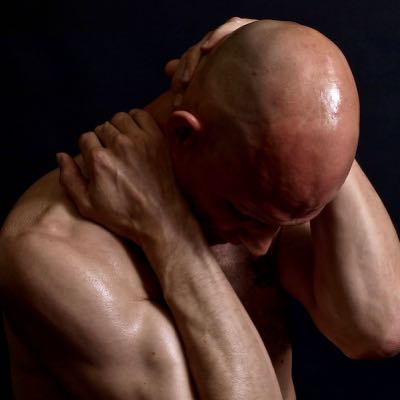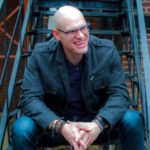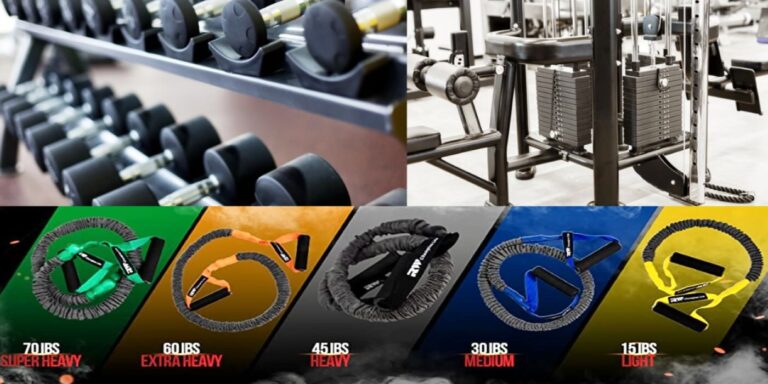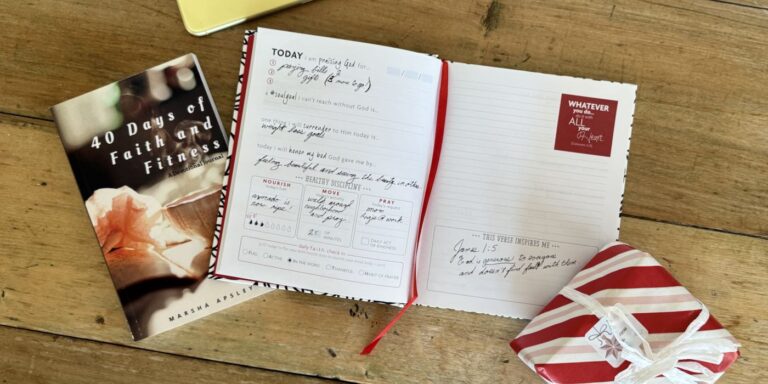By Aaron Daniel Behr, author and nutritional counselor
I stood in my home gym with a homemade noose around the power rack. The sun had barely risen on the day and I had been drinking. My thoughts were over the past two weeks, my breaking point (the moment of greatest strain at which someone or something gives way).
I had learned my wife had an affair. To top it off, I had a toxic thyroid. It was pumping a deadly amount of adrenaline, called thyroid storms, into my system. I hadn’t eaten or slept in days. She had me convinced she’d be better off with me dead. At 34 years old, with an otherwise clean bill of health, how did I get here?
THE GAMBLE
As a child I experienced bullying. I grew up and ignored it.
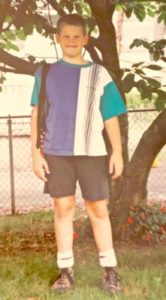 We all have areas in our life that we overlook. It’s a gamble to ignore them, like a game of Russian Roulette. Whether we are overweight which could cause a heart attack, or underweight, which leads to organ failure, or maybe it is something deeper.
We all have areas in our life that we overlook. It’s a gamble to ignore them, like a game of Russian Roulette. Whether we are overweight which could cause a heart attack, or underweight, which leads to organ failure, or maybe it is something deeper.
For me, it was an abyss, something that happened in my past. As a child, I had suffered a number of traumas. The largest of them was bullying and to add to that, I wrestled with a chemical imbalance. My brain produced too much electricity when anxieties hit. As a result, I experienced fight or flight responses and I came down from the high voltage with depression. Simple bullying about my bodyweight was compounded exponentially. I grew up and ignored it.
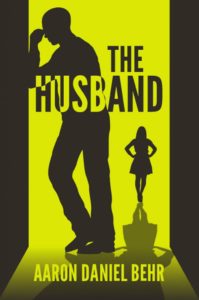 A LONG TIME BEFORE APRIL 8, 2017
A LONG TIME BEFORE APRIL 8, 2017(An excerpt from Aaron Daniel Behr’s book “The Husband”)
The Husband began as The Boy who grew up in the small town of Mount Vernon, Ohio. He was the eldest of three brothers. His father was a professor working a dream job, and his mother was a college grad working to make ends meet. They attended church every Sunday morning and night as well as Wednesday evenings.
For The Boy, school was…difficult. He was constantly bullied, which led to fist fights. Every night and morning he fought an emotional battle to convince himself to go to school. He was sad, cried often, and feared being at school as well as church.
In the early nineties, school districts were handing out Ritalin like candy. Every child who had any behavioral problems was diagnosed with ADHD. To the authorities in The Boy’s life, this was the answer to all his behavioral problems.
A psychologist determined that The Boy had a generalized anxiety disorder. They quickly put him on Buspar, patted him on the bum, and sent him back into the world. It worked, for a time, but The Boy was still depressed.
The psychiatrist’s answer was to put The Boy on Prozac. By the fourth grade The Boy became The Zombie. He would shuffle into school, zone out into outer space, and shuffle back home. Friendless, he’d spend his evenings in his room with Legos or his favorite hobby, staring at a nice corner of the bedroom ceiling.
The Boy, now The Zombie, was still being bullied, but like a good zombie he stood and drooled as this happened. The teachers eventually saw this and took sympathy on him. Instead of letting The Zombie go out to recess, they sat him in a small cabinet with a book.
High on Buspar and Prozac, The Zombie was sure of one thing— there was something wrong with him. He was not normal. He’d sit in class and think that he would always be nothing, a loser. Up to this point, that’s how he was treated, and the medication made him feel like nothing, dead. He was yearning for death.
MISGUIDED IDENTITY
No one stuck around to see me succeed. I broke myself trying to be someone I wasn’t.
I wish I could say this atrophying of self-image was all my fault. Boys are told not to cry, to fight against our bullies, that we have to pull ourselves up and move forward. The problem was that my identity was so poor, that I found women who were self-centered, cruel, and degrading. They affirmed the way I felt about myself. They confirmed my constructed identity. I believed all those names I had been called even into adulthood. The bullies never went anywhere. They became my bosses, my coworkers, and my wife.
I didn’t know who I was. There was this inner drive in me to prove them all wrong. It’s why I lost the weight, why I became a trainer, why I pretended to not have a mental illness. I had to prove them all wrong. The problem was, no one stuck around to see me succeed. The bullies didn’t care. I broke myself trying to be someone I wasn’t. It nearly killed me.
WELLNESS
I learned a lot about what it means to be normal and how to be “well”. I learned how to trust God.
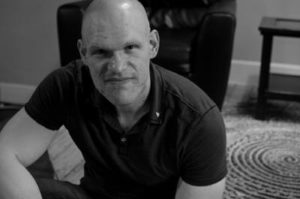 After I attempted to kill myself and was stopped, I was committed to a hospital. I had to face my demons. It began a six-month endeavor where I really searched out God. I had to get my mental illnesses of anxiety and depressive disorders under control, a thyroid removed, and deal with the very real trauma of an unhealthy marriage on top of years of neglected childhood pain. I learned a lot about what it means to be normal and how to be “well”. I also learned how to trust God.
After I attempted to kill myself and was stopped, I was committed to a hospital. I had to face my demons. It began a six-month endeavor where I really searched out God. I had to get my mental illnesses of anxiety and depressive disorders under control, a thyroid removed, and deal with the very real trauma of an unhealthy marriage on top of years of neglected childhood pain. I learned a lot about what it means to be normal and how to be “well”. I also learned how to trust God.
It really boiled down to asking myself, “At such a time as this, who are you going to be?” I had to intentionally decide I was going to be me, without the constraints of others perception of me. I stuck with things I could keep consistent, namely diet and exercise. My emotional and mental health were all over the place. I was dealing with a lot of stressors at one time, so to be able to lift weights every morning and eat well gave me control.
In that control, I was fundamentally better. I was on six different meds for mental health of which all caused drowsiness and weight gain. I had none of those ill effects. I lost weight and put on lean muscle. My powerlifting increased in weight each week. Working out became my non-negotiable outlet. It became the time where I put on spiritual music and prayed.
MY EXERCISE
If you were stranded on an island and wanted to keep your bones, vascular system, and joints in shape all you need to do are squats, push-ups, and find a branch to do pull-ups. These three exercises are the foundation of my lifting.
TWO LEG DAYS
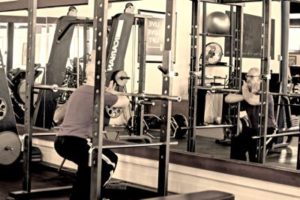 This is your largest muscle group. I focus primarily on squatting variations (back squats, hack, sumo, narrow). I circuit those with Romanian deadlift variations (wide, narrow, single leg). I also finish with a solid ten to fifteen minute plyometric HIIT (High Intensity Interval Training).
This is your largest muscle group. I focus primarily on squatting variations (back squats, hack, sumo, narrow). I circuit those with Romanian deadlift variations (wide, narrow, single leg). I also finish with a solid ten to fifteen minute plyometric HIIT (High Intensity Interval Training).
ONE PUSH DAY
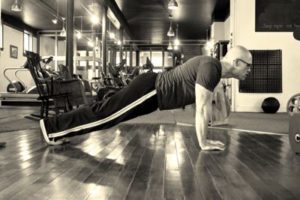 I focus on pushup variations to pre-exhaust myself. There is nothing better for your elbows, shoulders, and core. The athletes I train, I put five minutes on the clock and have them do as many as possible. The goal is that they add more reps over time. There is no reason to do bench press if you can’t move your bodyweight.
I focus on pushup variations to pre-exhaust myself. There is nothing better for your elbows, shoulders, and core. The athletes I train, I put five minutes on the clock and have them do as many as possible. The goal is that they add more reps over time. There is no reason to do bench press if you can’t move your bodyweight.
ONE PULL DAY
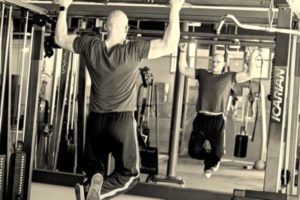 Again, like push-ups, I focus on pull-up variations. I put five minutes on the clock and see how many clean, kipping, and parallel rows I can do in that time. If you can’t do a healthy number of pull-ups, there’s no reason to isolate the back with lat pulldowns, rows, or other movements because the supporting muscles, those that keep our joints healthy, are being ignored.
Again, like push-ups, I focus on pull-up variations. I put five minutes on the clock and see how many clean, kipping, and parallel rows I can do in that time. If you can’t do a healthy number of pull-ups, there’s no reason to isolate the back with lat pulldowns, rows, or other movements because the supporting muscles, those that keep our joints healthy, are being ignored.
CONSISTENCY IS KEY
We hear this all the time. When it comes to our mental and physiological wellness, our body searches for homeostasis (stability). Our bodies search for balance. It needs continual work and healthy nutrition. If any portion of those things are lacking, it tends to break. It stores fat when we stress it out by not providing the correct balance of macro nutrients (the carbs, fats, and proteins that make up our physical tissue) and micro nutrients (the vitamins and minerals that help proper brain and internal function).
GOOD NUTRITION
 Document what you eat. Don’t count calories as much as you count grams of protein, fats, and carbs. Diversify your vegetables and fruits.
Document what you eat. Don’t count calories as much as you count grams of protein, fats, and carbs. Diversify your vegetables and fruits.
Go to local farmers markets. The athletes that I’ve seen succeed, or rather my ability to overcome the negatives of my medications, is directly tied to a healthy balance of food.
Food is the building block of our entire body. Don’t fill it with junk.
THE JOURNEY TO WELLNESS
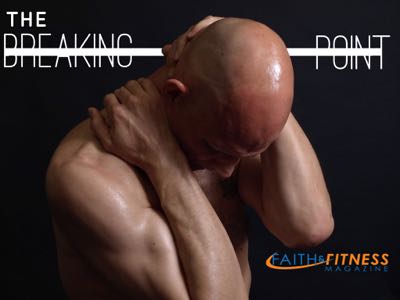 On my journey to wellness I asked myself this one question, “Who am I going to be?” I chose to be a healthy child of God. “The Husband” is a byproduct of that journey. In the book, I outline my struggle.
On my journey to wellness I asked myself this one question, “Who am I going to be?” I chose to be a healthy child of God. “The Husband” is a byproduct of that journey. In the book, I outline my struggle.
It wasn’t easy to choose God and be the full person He wanted me to be. I had to make it past my breaking point and let Him mend me. It was the best and worst thing to happen to me, but you’ll have to read The Husband to learn about it.
QUESTIONS FOR PERSONAL REFLECTION AND GROUP DISCUSSION:
- Arron begins this article by sharing about how his wife’s affair impacted him. Think about times when someone close has been dishonest with you. What makes that particularly difficult? Describe how you have navigated through that time in your life. His poor health and wellness exasperated his conditions. In what ways can God use fitness to help you through challenging times?
- Bullying and other difficult childhood experiences can make a significant impact for years. What have you experienced negatively as a child that has lingered into your adult life? What positive childhood experiences have helped draw you closer to God? What are some specific ways as an adult that you can parent or mentor a youth? What outcomes can that create for them?
- If you ask the same question Aaron asked,“Who am I going to be?”, what answers do you get? What is your breaking point? In what ways do you need to turn to God? Describe one instance where you can say you have seen the presence of God in your life.
